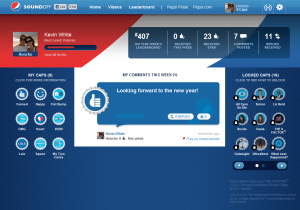Want smarter insights in your inbox? Sign up for our weekly newsletters to get only what matters to enterprise AI, data, and security leaders. Subscribe Now
![]()
Finding an identity all its own, Gigya, a six-year-old startup powering the social functionality behind brand name applications and reaching more than a billion people each month, has raised $15.3 million in its fifth round of funding.
Condé Nast owner Advance Publications and Adobe joined existing investors Mayfield Fund, Benchmark Capital, and DAG Ventures in piling in on the new round. Gigya has raised a total of roughly $45 million in funding to date.
Founded in 2006, Gigya refers to itself as the “leading provider of social infrastructure for business.” But, my goodness, there are some fuzzy buzzwords in that clause, so we asked CEO Patrick Salyer for a breakdown, in English, of what the company actually does.
“We have a series of social plug-ins … envision them as little widgets or applications, that sit on our clients’ sites that do different functionality,” he said. “The functionality can vary from social log-ins … to sharing, to commenting tools, to communication tools.”
So, when Nike, Pepsi, ABC, or Verizon need access to Facebook, Twitter, LinkedIn, Google, and other social APIs to create richer application experiences, they turn to Gigya. Nike, for instance, uses Gigya in its Nike+ iPhone and Android applications to allow users to log in or register through Facebook or Twitter, and to automate activity sharing to other apps, Salyer said.
Why can’t Nike or Gigya’s other 500 enterprise clients access Facebook’s or Twitter’s APIs independently and just build their own connections?
“We provide a single access point for many APIs,” Salyer said, adding that the company supports roughly 26 different APIs. “Beyond that, we actually maintain those APIs … what we do as a middle layer is manage changes. Finally … even if [clients] just want Facebook, we have a number of value added features that you could never get out of the box.”
The company’s social gamification tool, which tracks user activity to award points or badges and manage rewards (and is used by Pepsi), is one example of those features, Salyer said.
As for the part about being a leader, Salyer said that, through its client base, Gigya’s social applications reach more than 1 billion people every month.
Though Salyer wouldn’t provide specifics on revenue or comment on whether the company is profitable (safe guess: not yet), he did say that Gigya’s 2011 sales tripled year-over-year, and added that the company is adding 75 to 100 customers every quarter. Gigya’s services start at tens of thousands dollars, he said, which means that most clients are top, enterprise-level businesses in publishing and retail arenas.
Gigya, which employees 130 people spread across four offices, will be using its fresh cash hoard to expand internationally (it just opened a UK office in London), grow the sales team, and push out new products.
Photo credit: Shutterstock


